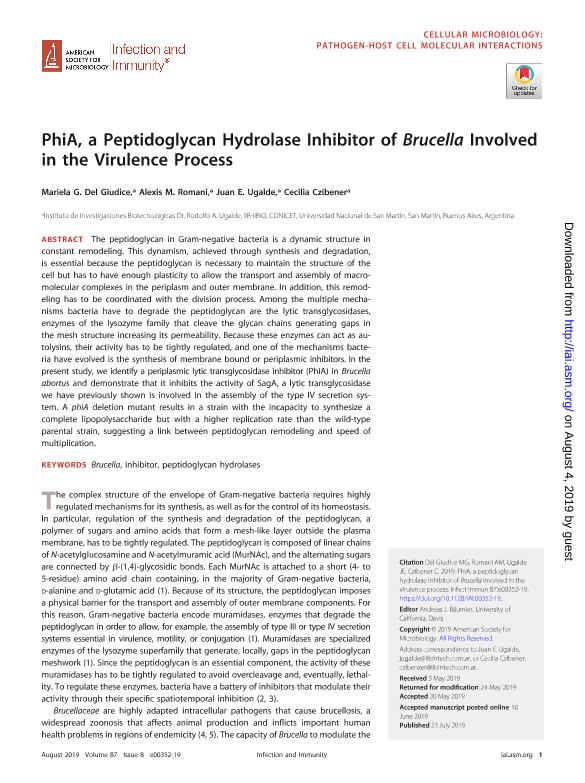Artículo
PhiA, a peptidoglycan hydrolase inhibitor of brucella involved in the virulence process
Fecha de publicación:
07/2019
Editorial:
American Society for Microbiology
Revista:
Infection and Immunity
ISSN:
0019-9567
Idioma:
Inglés
Tipo de recurso:
Artículo publicado
Clasificación temática:
Resumen
The peptidoglycan in Gram-negative bacteria is a dynamic structure in constant remodeling. This dynamism, achieved through synthesis and degradation, is essential because the peptidoglycan is necessary to maintain the structure of the cell but has to have enough plasticity to allow the transport and assembly of macromolecular complexes in the periplasm and outer membrane. In addition, this remodeling has to be coordinated with the division process. Among the multiple mechanisms bacteria have to degrade the peptidoglycan are the lytic transglycosidases, enzymes of the lysozyme family that cleave the glycan chains generating gaps in the mesh structure increasing its permeability. Because these enzymes can act as autolysins, their activity has to be tightly regulated, and one of the mechanisms bacteria have evolved is the synthesis of membrane bound or periplasmic inhibitors. In the present study, we identify a periplasmic lytic transglycosidase inhibitor (PhiA) in Brucella abortus and demonstrate that it inhibits the activity of SagA, a lytic transglycosidase we have previously shown is involved in the assembly of the type IV secretion system. A phiA deletion mutant results in a strain with the incapacity to synthesize a complete lipopolysaccharide but with a higher replication rate than the wild-type parental strain, suggesting a link between peptidoglycan remodeling and speed of multiplication.
Palabras clave:
BRUCELLA
,
INHIBITOR
,
PEPTIDOGLYCAN HYDROLASES
Archivos asociados
Licencia
Identificadores
Colecciones
Articulos (IIBIO)
Articulos de INSTITUTO DE INVESTIGACIONES BIOTECNOLOGICAS
Articulos de INSTITUTO DE INVESTIGACIONES BIOTECNOLOGICAS
Citación
del Giudice, Mariela Giselda; Romani, Alexis Mariano; Ugalde, Juan Esteban; Czibener, Cecilia; PhiA, a peptidoglycan hydrolase inhibitor of brucella involved in the virulence process; American Society for Microbiology; Infection and Immunity; 87; 8; 7-2019; 1-10
Compartir
Altmétricas




